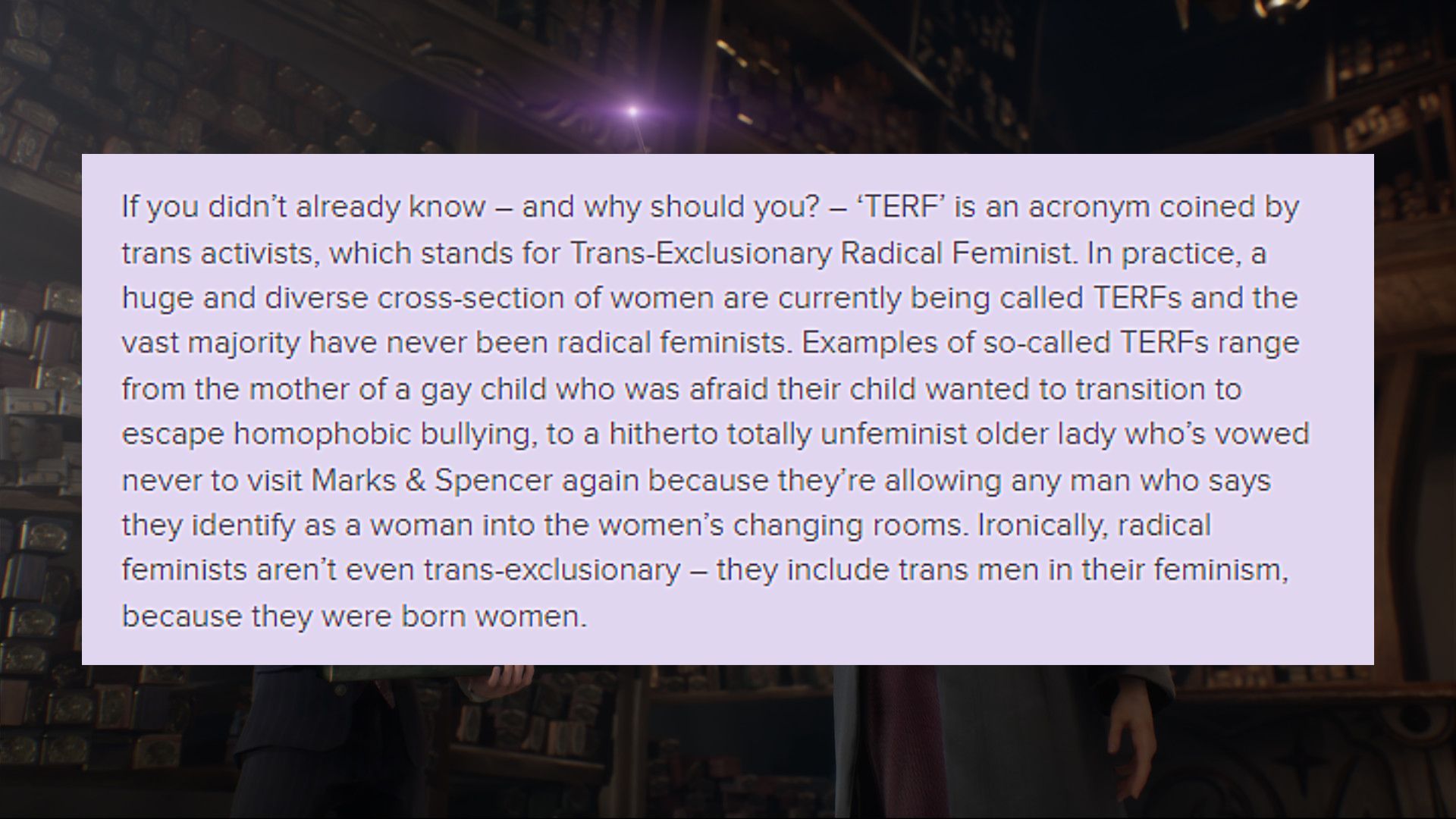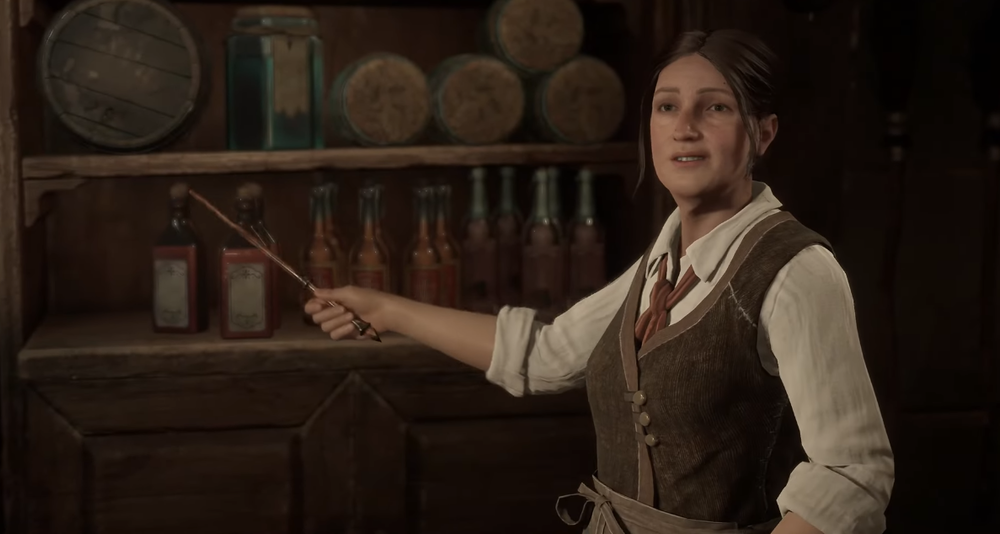February 19, 2023
J.K Rowling’s endless war against the so-called erosion of women’s identity has ruined Hogwarts for many Trans people who grew up with Harry Potter. But, besides having their childhood’s magical fantasy ruined, Trans women didn’t care much. There was barely any new Harry Potter content, so the community and the movie’s cast sidelined the author, and the case was shut.
However, Hogwarts Legacy’s release has once again opened Pandora’s Box of gender wars, transphobia, hate, discord, and internet word vomit. So what’s really the problem?
What exactly did J.K Rowling do?
Whatever beliefs J.K Rowling had were under wraps until 2018 when the author liked a tweet that compared transgender women to “men in dresses.” According to the author, a “clumsy and middle-aged moment” was the cause behind the misclick. Whatever the case, the backlash was imminent as her views became more transparent in the next few years.
In 2020, Rowling publicly expressed her views regarding gender identity in an elaborate essay following a tweet quoting a Devex article that used “People who menstruate (https://www.devex.com/news/sponsored/opinion-creating-a-more-equal-post-covid-19-world-for-people-who-menstruate-97312)” in the headline instead of women.
This tweet fueled social media-wide chaos, urging celebrities, authors, and politicians to weigh in on the subject. Thankfully for Trans-Potterheads, the lead cast of Harry Potter publicly opposed Rowling’s views, making clear that “Trans women are women.” But, she still had strong support from fellow TERF (Trans-exclusionary radical feminists) personalities.
“What I didn’t expect in the aftermath of my cancellation was the avalanche of emails and letters that came showering down upon me, the overwhelming majority of which were positive, grateful, and supportive.” Rowling wrote in her essay.
In her essay, Rowling also discussed her personal experiences with abuse and sexual assault and how these experiences have shaped her views on sex and gender issues. She argued that women need safe spaces and protections based on biological sex and that the increasing emphasis on gender identity erodes these rights.
Here’s an interesting excerpt from the lengthy piece:

Is J.K Rowling transphobic or just misunderstood?
The backlash was severe, but J.K Rowling didn’t budge. Instead, her Twitter page was laden with threads in which she doubled down on her beliefs, trying hard to paint herself as an ally of Trans women. Thanks to her soft, empathetic tone, many were convinced, but concerns remain. An excellent essay by Trans model and author Valentijn De Hingh shows precisely how many trans-Potterheads who found the courage in Harry Potter books felt. Rowling’s views weren’t just problematic; they were heartbreaking. But at least she wasn’t tone-deaf; her former fans found solace in that.
“I respect every trans person’s right to live any way that feels authentic and comfortable. I’d march with you if you were discriminated against on the basis of being Trans. At the same time, my life has been shaped by being female. I do not believe it’s hateful to say so,” Rowling said in one of her Tweets.
Still, many, including Emma Watson, were of the belief that Trans people should be able to identify as who they want to be, and no matter how kind her tone, Rowling’s views were radical and opposite. You could say, it was transphobia plated nicely in clean china.
Her Twitter rants regarding Trans health, erosion of women’s identity, and whatnot continued. For example, in July 2020, J.K. Rowling posted a series of tweets expressing concern about the use of hormone therapy and antidepressants for young people questioning their gender identity. She argued that these treatments are being over-prescribed and can have serious side effects and that young people may be rushing into decisions about their gender identity without fully understanding the consequences.
But the online community had started a #RIPRowling trend, and no one cared as much. However, her new books didn’t help.
Even her new books are problematic
In the book Troubled Blood, the character is a cisgender male who dresses as a woman to deceive and kill women. Many people, including transgender advocates and allies, have criticized the portrayal as harmful and perpetuating negative stereotypes about the transgender community, particularly the idea that transgender individuals are deceitful and dangerous. In addition, many people saw the book’s portrayal of the transgender character reinforcing Rowling’s transphobic views.
In 2022, all of this and more is catching up to her most famous book series to date, Harry Potter, as Warner Bros. released Hogwarts Legacy. Although J.K. Rowling isn’t deeply involved in the development process, at least what the official website says, players are not sold.
“While Hogwarts Legacy is not a direct adaptation of the books and films, the game is anchored in Wizarding World lore. Avalanche has created a unique gaming experience that is inspired by the magical universe created by J.K. Rowling,”
Players, streamers, and notable figures boycotted Hogwarts Legacy, but it still managed to break records on Twitch. Now, the fan base is split, and the game has become a moral issue. Hogwarts Legacy also appears to have a Trans character dubbed Sirona, but fans are also nitpicking about her storyline and name.

In addition, streamers playing the game are getting bullied by anti-Rowling groups, which is concerning. Even many Trans streamers have come forward, urging everyone to boycott the game in peace.
Safe to say, the dust isn’t settling, and Hogwarts Legacy has raised many important questions within the gaming community. Is it really just a game, or does it have serious real-life consequences?
